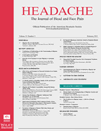 A University of Mississippi study of headaches among HIV patients is being hailed as a critical step to improving treatment and reducing unnecessary medical costs among sufferers.
A University of Mississippi study of headaches among HIV patients is being hailed as a critical step to improving treatment and reducing unnecessary medical costs among sufferers.
The paper, “Headache among Patients with HIV Disease: Prevalence, Characteristics, and Associations,” is being published in a forthcoming issue of the journal Headache and is already available online.
The study, which is attracting broad interest in the medical and mental health communities, was conducted as part of a doctoral dissertation by UM psychology alumnus Kale Kirkland while working in the Headache Research and Treatment laboratory under Todd Smitherman, assistant professor of psychology. The study was conducted in conjunction with clinicians from the University of Alabama Health Center in Montgomery.“This research is of interest to clinicians and physicians for several reasons,” Smitherman said. “Recent research from the U.S. Centers for Disease Control and Prevention shows that, despite the availability of medications that effectively slow disease progression, most Americans with HIV do not have the disease under control. Our study shows that patients with poorly-controlled HIV/AIDS are most prone to suffer also from frequent, severe migraines at rates that far exceed those of the general population.”
Specifically, the results of the study show that headache affects one of every two HIV/AIDS patients, but these are not your typical, run-of-the-mill tension headaches.
Approximately 27.5 percent of the patients studied met criteria for “chronic migraine,” a rare headache condition in which a person has migraine symptoms – with or without other headaches – for 15 or more days per month. In comparison, only 2 percent of the general population is classified as having chronic migraines.
“This translates into a 13-fold increased risk of chronic migraine among patients with HIV disease,” Smitherman said. “The strongest predictor of headache was the severity of HIV disease, such that patients with more advanced disease had more frequent, more severe and more disabling migraines.”
This is the first study since the proliferation of highly active antiretroviral therapy, or HAART, medication to demonstrate that having HIV/AIDS portends a very high risk of headache, particularly migraines.
These data highlight how important it is for physicians to regularly monitor CD4 levels, an indicator of immune system functioning, among this population and to pay close attention to headache symptoms among patients with more advanced disease. They also emphasize the importance of adherence to medication regimens among HIV patients.
“The study used a structured diagnostic interview to assess headache symptoms consistent with diagnostic criteria from the International Classification of Headache Disorders among 200 clinic patients in Montgomery, Alabama with HIV or AIDS,” Smitherman said. “Patients also completed measures of headache-related disability, and their medical records were reviewed for information about prescribed medications, CD4 cell count, date of HIV diagnosis, possible secondary causes of headache and other relevant medical history.”
“We decided to conduct this study due to a lack of research in the area of headaches in the HIV population,” Kirkland said. “In general, prior to our study, there was no ‘typical’ HIV headache.
“With the results from our study, we hope that infectious disease physicians will now be able to discuss with HIV patients what to expect in terms of headaches. This should also help prevent unnecessary medical costs, lessening the need to have expensive procedures – such as MRIs and spinal taps – ordered to rule out opportunistic infections.”
HIV-related infections were determined not to be frequent causes of headache among patients in the study, but the authors caution that further studies that include neuroimaging procedures are needed to confirm these findings.
Because the study came from a psychological perspective, Smitherman and Kirkland said they hope to further educate mental health professionals on HIV, which should help improve treatment, given that HIV patients also have increased rates of depression and anxiety.

